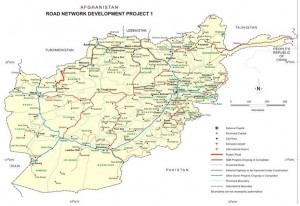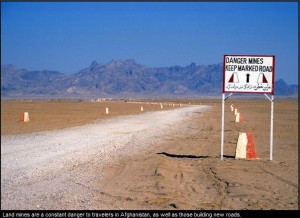More than one month ago we observed that Punjabi militants under the authority of Tehrik-i-Taliban chief Baitullah Mehsud had begun to target the Punjab province, the most populous province in Pakistan. Today, Tehrik-i-Taliban spokesmen claimed credit for the most recent terrorist attack in Lahore as well as others throughout the North West Frontier Province.
Four bombs exploded at separate locations in Pakistan’s north-west on Thursday shortly after the Taliban warned that they were beginning a broader bombing campaign in retaliation for the army’s offensive in Swat.
Two of the bombs went off in a market in the old quarter of Peshawar, the northern frontier city, killing at least seven people and injuring 40.
Shortly after the Peshawar blasts, a suicide bomber attacked a paramilitary checkpost in another part of Peshawar, in which at least five people were killed. Police later said that two gunmen had been killed and two suspects detained after gunmen opened fire from a rooftop following the attack.
Later, a bomb blast in the city of Dera Ismail Khan killed at least two people while five more were hurt. A senior security official in Islamabad said: “These attacks strongly indicate a new terrorist campaign.”
The violence came after the Pakistani Taliban claimed responsibility for Wednesday’s suicide car-bomb and gun attack in the eastern city of Lahore that killed up to 35 people, saying it was in revenge for an offensive in the Swat region.
Speaking before the Peshawar blasts, Hakimullah Mehsud, a militant commander loyal to Pakistani Taliban leader Baitullah Mehsud, warned of more violence.
“We plan major attacks against government facilities in coming days and weeks,” he told Reuters by telephone. The government has ordered cities to be on alert.
Baitullah Mehsud was the prime suspect for the bomb blasts in the Peshawar, a senior government official said on Thursday.
“We had already concluded that Baitullah Mehsud was behind this attack (in Lahore) but now he is claiming responsibility,” said another Pakistani senior intelligence official. “I believe the attack in Peshawar also bears the hand prints of Mehsud.”
This isn’t some disjointed campaign, but one which is correlated to the ongoing Taliban and al Qaeda operations throughout the region. Said one al Qaeda spokesman:
“The Pakistan army could then have launched an all-out war in the tribal areas, and we could have retaliated with equal strength. In that process, Pakistan would have become a battleground and enemies like India and the US would have received the chance to intervene. Although in our files Pakistan does not exist, we of course don’t want enemies of Islam to take advantage of any situation.”
The battle against Pakistani forces isn’t one in which either the Taliban or al Qaeda want to engage. But there is a strategic reason for doing so.
Al-Qaeda’s main priority is to use natural landmarks as boundaries against the security forces. The first success has been in securing an area all along the Hindu Kush mountains from Terah Valley in Khyber Agency up to the Turban district of Pakistan’s Balochistan province bordering Iran.
The second target is to push Pakistani forces back beyond the Indus River. The source of the Indus is in Tibet; it begins at the confluence of the Sengge and Gar rivers that drain the Nganglong Kangri and Gangdise Shan mountain ranges. The Indus then flows northwest through Ladakh and Baltistan into Gilgit, just south of the Karakoram range. The Shyok River, Shigar and Gilgit streams carry glacial waters into the main river. It gradually bends to the south, coming out of the hills between Peshawar and Rawalpindi in Pakistan.
It essentially means that militants would allow the writ of the state up to Punjab and Sindh provinces, but they want complete control in parts of NWFP and parts of Balochistan …
Al-Qaeda repeated that its goal was to make the Pakistani security forces neutral in the “war on terror”. The overall object is to win the war in Afghanistan. To this end, al-Qaeda will continue to engage the security forces in the Swat area.
The simple reason is that al-Qaeda fears that the military, under US pressure, has plans in place to move into North and South Waziristan, where al-Qaeda and the Taliban have key resources vital to their struggle in Afghanistan. So it is better to keep the military pinned down in Swat.
The Tehrik-i-Taliban is an arm of al Qaeda, or actually, the two are so joined in ideology now that both are global in their import, and Mehsud, the man whom The Captain’s Journal loves to hate, may be the most powerful of all Taliban with more fighters at his disposal than any other leader, whether Taliban or al Qaeda.
The goal is first to retake Afghanistan, and insofar as Pakistan is in the way, it is seen as coupled with the “enemy” and is to be at least kept at bay. Later, their globalist ideology would manifest itself in larger geographical campaign against the West, the sanctuaries not being limited to Yemen, Somalia, and Pakistan. After recent threats by Baitullah Mehsud to attack Washington, various analysts went on record saying that he was basically a regional threat but that he lacked the capabilities or resources to attack outside his area of influence.
That assessment is profoundly shortsighted. We have seen from the Hamburg cell that a successful attack against the West requires money, ideology, weapons and tactics training and language training. Mehsud’s organization currently has three out of the four prerequisites (and may have all four), and language training doesn’t take long. Do not underestimate Baitullah Mehsud.





